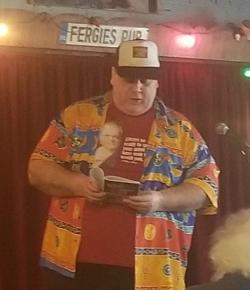TIBETAN BUDDHISM MEETS AMERICAN ZEN BEAT
Folder:
z NOTES FROM THE CAVERN
Any reader of Beat Literature should be aware of the Naropa Institute in Boulder, CO. This college features a subdivision called the Jack Kerouac School of Disembodied Poetics. Several Beat or Beat related poets like Allen Ginsberg and Gary Snyder have taught creative writing classes there. There are also younger poets like Sam Kashner who learned some of the trade there.
What many may not know is that the Naropa Institute was founded by Tibetan Buddhist Chogyam Trungpa. It focuses on Shambhala training and meditation. The Kerouac school was added on in 1974 due to Trungpa's longtime friendship with Ginsberg. Trungpa has written many books on Shambhala training and meditation in his long career. He also boasts a poetic spirit and used verse to express himself very well. Timely Rain: Selected Poetry of Chogyam Trungpa gives one a chance to examine his verse.
Timely Rain includes an introduction written by Ginsberg. The introduction is an essay from 1983 used because Ginsberg passed away in 1997 before completing a new introduction. Ginsberg makes an effort to place Trungpa's poetry within a poetic tradition. He draws comparisons to Shelley, Kerouac and Rimbaud. He fails to note the Eastern aspect of Trungpa's verse and philosophy. That is typical of Ginsberg to narrow someone else's poetry down to his own vision.
The volume covers poems written throughout his life. Dates aren't provided so one is left to wonder when specific poems were actually written. The volume covers nearly two hundred pages of poems. The introduction and afterword provide some hints on a scant few poems so my guess would be that poems cover from the mid 60s through the early 90s. It would be interesting if the poems were presented chronologically as one could observe growth as a poet. That luxury is denied the reader in this volume.
This is an interesting collection but it is an uneven book. There are some really sparkling gems but there are also a few sophomoric efforts. I guess, Trungpa is a spiritual advisor first and poet second. How much one enjoys poetry will determine whether or not they find this volume worthwhile. I think those interested in Buddhist thought or Beat oriented poetry might be the most likely to find something of value here. Trungpa was influenced by Ginsberg and in several poems wears that influence on his sleeve. There are other poems that are kind of simplistic in their message.
It is also interesting that I found some of the simplistic poems to have a certain charm to them. The title poem includes phrases like bombarded by coconuts of wakefulness. This may seem like a childlike simile and yet it did bring a smile to my face. Many of the poems in the volume have this kind of simplicity that still elicits a smile.
Does Love Kill Anybody? raises a valid question and also makes the observation that “poetry is not a burden for the true poet.” I go to enough poetry readings to know that there's a lot of false poets out there. Trungpa is reveling in the joy of creation. I found inspiration in this poem because I find it true with my own writing. The best stuff tends to flow freely. Trungpa has an acute understanding and empathy for the creative spirit. He's kinder than I am because he doesn't tell those who find poetry a burden to give it up. I would.
Many of the poems included here involve meditating on natural surroundings. This might be hackneyed material but Trungpa is often able to pull it off. Whistling Grasses of the Esk Valley is a good example of this. Here he is writing of a hailstorm and urging children to seek safety. He writes of the mighty storm:
The Esk River turns reddish in color,/Sweeps all the trees and branches away. /A mighty force invades our valley-- /Fishes thrown up on the banks for bird's delight.
He also observes skylarks hunting, happy elephants and the north of the sky. The Ginsberg influence reveals itself on a number of poems that involve urban surroundings. He is perfectly comfortable on 78 Fifth Avenue or 1111 Pearl Street. He tries to make sense of the world that surrounds him.
It was a desolate space you provided today; / It was hearty but sadly WASP./ The subtle air of power is devastating / in the midst of Black Velvet advertising.
This is a pretty good volume although many of the poems are hit or miss. The reader will simply have to trudge through the book to find the gems. I also like other poems like Completely Intoxicated by You and Return to Loveland. These are poems that reflect on his spirituality and his basic faith in humanity.
Trungpa can be sentimental or coolly reflective by turns. He also has the ability to be poignant. I wouldn't rank him as a world class poet but this volume will be of interest to fans of poetry and those interested in Buddhist thought. Trungpa is a fascinating philosopher and theologist. He's also a decent poet which comes through in many poems throughout this volume. I would warn that he utilizes free verse so those who feel poetry must rhyme will not really like this much. It is for those who wish to see a religious man searching for meaning in words.
